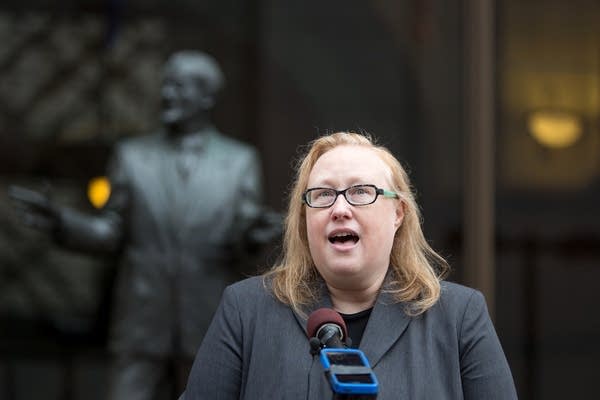ACLU presses Minneapolis to move on police reforms

Go Deeper.
Create an account or log in to save stories.
Like this?
Thanks for liking this story! We have added it to a list of your favorite stories.
American Civil Liberties Union leaders laid out their list of recommended police reforms Thursday as they called on Minneapolis officials to help reduce racial disparities in the criminal justice system.
An ACLU report made public last week found that people arrested in Minneapolis for low level crimes were nearly nine times more likely to be black or Native American than white.

Many of the recommended reforms can be implemented by the police department, ACLU legal director Teresa Nelson said. That includes police wearing and using body cameras "to record every interaction with ... the community."
The ACLU list also calls for strengthening the department's existing rules against biased policing, giving the city's civilian police oversight group more authority and ensuring that officers aren't rewarded just for making lots of arrests.
Turn Up Your Support
MPR News helps you turn down the noise and build shared understanding. Turn up your support for this public resource and keep trusted journalism accessible to all.
Minneapolis police officials are evaluating the results of a six-month body camera pilot program and will discuss the policy for using the cameras next week.
Some of the report's recommendations, like strengthening the powers of the Office of Police Conduct Review, will require changes in state law. In 2012, the legislature passed a law barring local civilian review boards from making findings of fact or other binding decisions when reviewing complaints of officer misconduct.
The ACLU report was hailed by civil rights advocates who say it's more proof that Minneapolis police officers unfairly target people of color.

If the underlying causes of the disparities aren't addressed soon, the unrest seen in cities like Baltimore and Ferguson will come to Minneapolis, University of St. Thomas law professor and Minneapolis NAACP President Nekima Levy-Pounds said.
"When you have a lack of economic justice coupled with police abuse, police brutality and harassment then you get the same type of uprisings as what we've seen in other parts of the country," she said.
Minneapolis Police Chief Janee Harteau had already been working to implement policies similar to those recommended in the ACLU report, such as anti-bias training for officers.
Harteau was out of town at a police conference Thursday. Last week, Harteau said she welcomed the ACLU report but that arrest numbers and other data were only part of the picture and that low level arrest disparities are often a matter of geography as well as race.
The chief has also said the ACLU's analysis of the arrest numbers didn't take into account repeat offenders. According to MPD data, between 2010 and 2014, people who'd been arrested at least once before made up nearly a third of all arrests.
Out of 65,534 arrests between 2010 and 2014, 20,387 were of people arrested at least once before during that period. MPD tallied 15 people who were arrested between 51 and 80 times between 2010 and 2014.
A few of the recommendations from the ACLU may soon be checked off the list.

The authors of the report say the city should repeal several laws they say are often used by police to unfairly target people of color, which then contributes to racial disparities in arrests.
A proposal to eliminate two of those laws, spitting and lurking, will come up for a vote Friday.
Minneapolis City Council Member Cam Gordon said he's confident a majority of council members will vote with him to erase the laws from the books.



